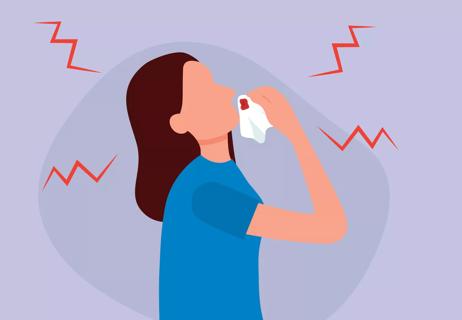Take care of your runny or stuffy nose by staying hydrated, using a humidifier and considering a medication

Sniffle. Sniffle. Sniffle. Your nose is a faucet, and there’s no way to turn it off. Your coworkers shoot you irritated looks as you clear your throat (again). Your box of tissues has become your closest companion (and admit it — your sleeve has been called in to pinch hit on a couple of terrible occasions).
Advertisement
Cleveland Clinic is a non-profit academic medical center. Advertising on our site helps support our mission. We do not endorse non-Cleveland Clinic products or services. Policy
So, why is your nose constantly running or stuffy? Causes typically range from the common cold and seasonal allergies to nasal obstructions.
Ear, nose and throat (ENT) physician Tony Reisman, MD, explains what your sniffles mean — and what you can do about them.
Your sniffles are technically nasal congestion. You may have a runny or stuffy nose and need to take short breaths to get rid of the mucus building up in your nose. The color of your mucus can range from clear to white to yellow or green.
And you may have other symptoms with sniffles such as:
While the sniffles aren’t usually serious, nasal congestion can impact the quality of your sleep. You may have trouble sleeping throughout the night, feel drowsy in the morning and may snore (more than usual!).
It can be hard to pinpoint what’s causing your sniffles. Many problems can lie behind that runny or stuffy nose. Dr. Reisman outlines a few possibilities.
One of the most common reasons for your sniffles is the common cold or flu. Both of these viral infections affect your nose leading to a runny nose — and other common symptoms.
Cold season is typically in the fall and winter — and can happen to you if you’ve been in close contact with someone who has a cold. You’ll typically experience symptoms (sore throat, cough, sneezing) for just a few days but may notice your sniffles last for a few weeks.
Advertisement
And when it comes to the flu, flu season is typically from October to May. If you have the flu, you’ll usually experience symptoms like a sore throat, cough and fever — and in some cases, a runny or stuffy nose.
If your nose gets stuffy when the pollen flies, you’ve probably already pinpointed the problem: seasonal allergies.
But not all allergies are as obvious as hay fever. Many people have year-round reactions to indoor allergens such as mold, dust mites or animal dander. Other symptoms include itchy or watery eyes, a scratchy throat and fatigue.
Your nose can react to irritants that aren’t known allergens, Dr. Reisman says. And that can cause a case of the sniffles.
Exposure to substances such as smoke, fragrances or household chemicals can sometimes cause congestion and inflammation in the nose. Changes in temperature or barometric pressure can also cause nonallergic rhinitis, he adds. (Thanks a lot, weather.)
It’s a classic case of the treatment being worse than the disease. People often turn to over-the-counter nasal sprays to clear a stuffed-up nose. But sprays that contain oxymetazoline can be addictive and worsen congestion symptoms like sniffling over time.
“The more you use it, the more you want it, but the less effective it is,” Dr. Reisman clarifies. “I recommend using those products only with direction from your doctor.”
If you have a sniffling toddler, you’ll definitely want to check that a blueberry or a bead didn’t magically make its way up a nostril. (“It just fell in! Really!”)
But wayward snacks and toys aren’t the only things that can block nasal passages. Other sniffle-inducers include growths and anatomical issues, like:
Sinus infections famously cause your head to pound and your eyes to throb. But not always. Some infections present with unusual symptoms (like bad breath) — or no symptoms at all.
Advertisement
“Constant sniffling or a chronic sinus infection might not have any symptoms other than ongoing drainage,” Dr. Reisman notes. “Unless you saw an allergist or ENT [ear, nose and throat] doctor, you might never know you have it.”
Whether you’re sniffling just a few days or dealing with chronic sniffles all the time depends on what’s causing them.
If you’ve been sniffling for weeks or months, you can rule out a cold, Dr. Reisman says. Colds typically go away on their own after about a week. But causes like seasonal allergies can last for a few months.
If you’re determined to keep the sniffles at bay, Dr. Reisman says these at-home treatments may help:
Advertisement
If you’re not feeling any relief, in some cases, a healthcare provider may prescribe treatments, which can vary depending on the cause. For example, antibiotics are often used to beat a chronic sinus infection.
With such a long list of possible causes, how do you get to the bottom of your runny or stuffy nose problems?
“It’s tough to diagnose on your own,” Dr. Reisman says. “If symptoms last more than a month and over-the-counter remedies haven’t done the trick, it’s time to see a physician.”
Primary care is a good place to start. If your general practitioner can’t get to the bottom of it, an ENT or allergist should be your next stop.
Unfortunately, it’s not always easy to guess whether the problem might be due to an allergy or a structural issue. You might have to visit both specialists to land on the correct diagnosis.
So, take a deep breath (through your mouth): The cause of your sniffles is usually treatable, Dr. Reisman reassures. Talk to your doctor about putting an end to your runny nose. Your tissue box might get a little lonely, but your coworkers will thank you.
Advertisement

Sign up for our Health Essentials emails for expert guidance on nutrition, fitness, sleep, skin care and more.
Learn more about our editorial process.
Advertisement

If your nose is constantly running, it could be allergies, chronic sinusitis, nasal polyps or other concerns

Allergies, indigestion and the effects of gravity can all mess with your nose at night

Staying calm, sitting up straight and gently pinching the sides of your nostrils can help a bloody nose go away faster

Dry air, allergies or nose-picking may be to blame for nighttime epistaxis

Allergies, acid reflux and even pregnancy can increase drainage and upset your stomach

Seek help if bleeding doesn’t stop or they’re interfering with your life

It’s usually the way your nose manages airflow, but sometimes, it could be other issues

Correct positioning is one of the keys to getting the best results

The tropical fruit is a good source of antioxidants and vitamin C

Most people fall asleep within 10 to 20 minutes, but if your experience is different, adjusting your sleep schedule may help

Exploring your hidden side can lead to better understanding of what makes you tick